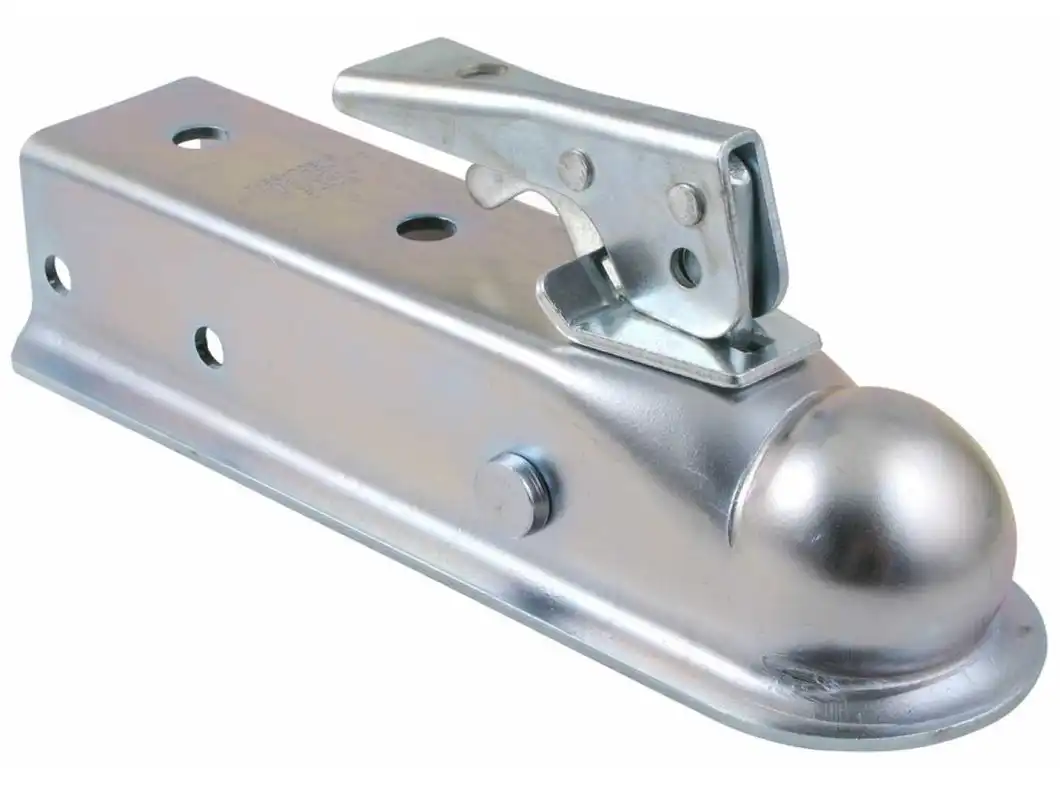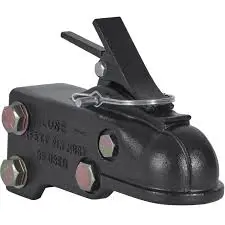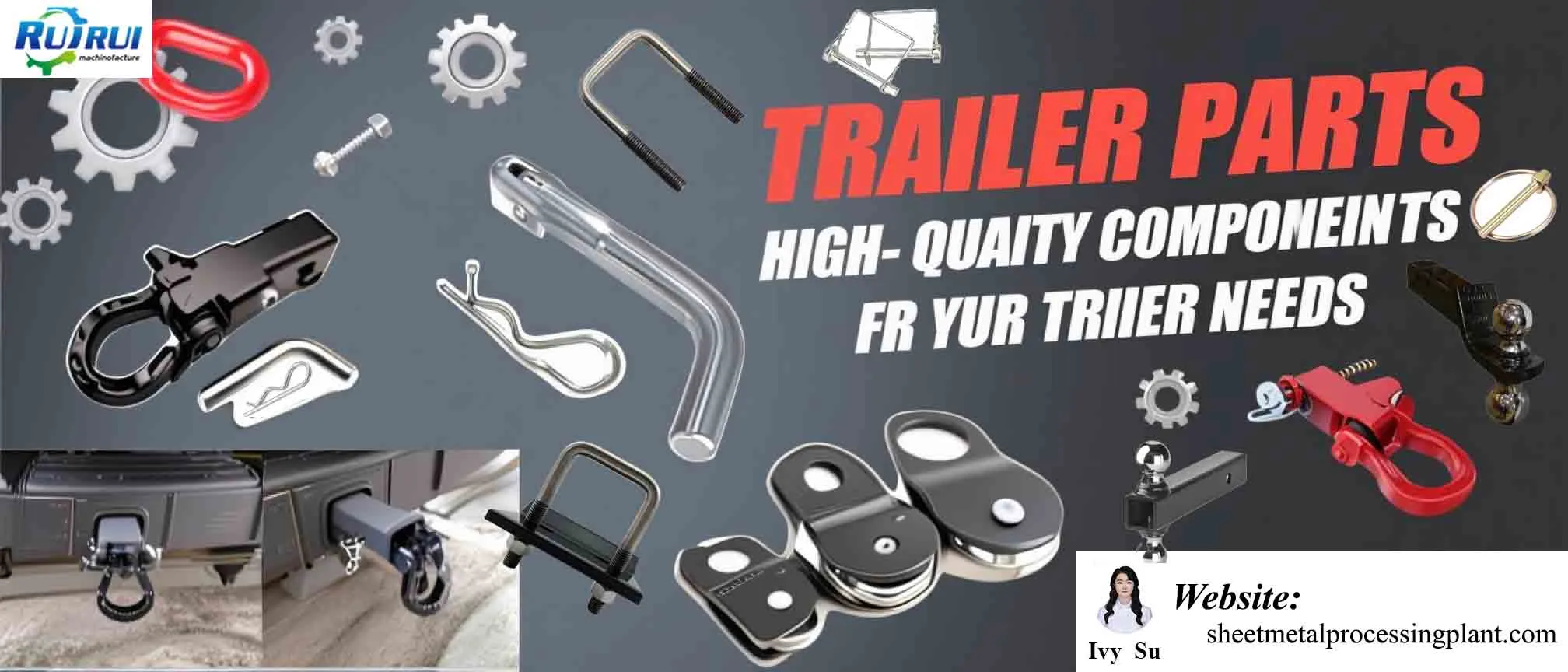Heavy-Duty Trailer Coupler Buying Guide: What Professionals Recommend
2025-10-28 14:32:15
Have you ever experienced a trailer detaching mid-journey or struggled with incompatible coupling systems? Choosing the right Heavy-Duty Trailer Coupler can prevent catastrophic failures and ensure safe, efficient towing operations for years.

Understanding Heavy-Duty Trailer Coupler Specifications
When selecting a trailer coupler, understanding the technical specifications becomes your first line of defense against equipment failure. Professional haulers recognize that not all couplers deliver equal performance under demanding conditions.
-
Load Capacity and Weight Ratings
The gross trailer weight rating determines whether your Heavy-Duty Trailer Coupler can handle your specific hauling needs. Most professional-grade couplers support loads ranging from 5,000 to 25,000 pounds, though specialized industrial units exceed these limits. The Trailer Coupler must match both your trailer's loaded weight and the towing vehicle's capacity to prevent structural failure during transport. Material composition directly impacts load-bearing capability. High-grade steel alloys, particularly those processed through progressive stamping and deep drawing techniques, offer superior strength-to-weight ratios. Manufacturers utilizing advanced metal fabrication methods produce couplers with consistent wall thickness and optimized stress distribution across critical connection points.
-
Coupler Size and Ball Compatibility
Matching your coupler to the correct hitch ball size prevents dangerous separation incidents. Standard Heavy-Duty Trailer Coupler sizes include 2-inch, 2-5/16-inch, and 3-inch ball configurations. Professional operators verify both dimensions before purchase, as even minor mismatches compromise connection security. The locking mechanism design varies significantly between manufacturers. Quality couplers incorporate positive-locking latches with visual confirmation indicators, allowing drivers to verify secure engagement before departure. Some advanced models feature spring-loaded mechanisms that automatically engage when properly seated on the hitch ball.
Material Selection for Maximum Durability
The longevity of your Trailer Coupler depends heavily on material choices and surface treatment processes. Professionals prioritize couplers manufactured from corrosion-resistant materials with appropriate protective coatings.
-
Steel Grades and Alloy Compositions
Cold rolled steel provides excellent dimensional accuracy and surface finish, making it ideal for precision coupling components. Manufacturers specializing in metal stamping often utilize mild steel for standard applications and high-strength alloy steel for extreme-duty scenarios. The material selection process considers operational environments, expected load cycles, and exposure to corrosive elements. Stainless steel couplers, while more expensive, eliminate rust concerns in marine or chemical transport applications. Brass and copper alloy components appear in specialized electrical grounding applications where conductivity matters. Professional-grade Heavy-Duty Trailer Couplers often combine multiple materials, using stainless steel for exposed surfaces and high-strength steel alloys for load-bearing structures.
-
Surface Treatment and Coating Options
Powder coating provides durable, weather-resistant protection that withstands impacts and abrasion better than traditional paint. The electrostatic application process ensures complete coverage, including hard-to-reach internal surfaces. Quality manufacturers apply powder coatings after thorough surface preparation involving deburring, sonic cleaning, and etching processes. Zinc plating offers excellent corrosion resistance at lower cost than stainless steel construction. The electroplating process deposits a protective zinc layer that sacrifices itself to prevent underlying steel corrosion. Some premium Trailer Coupler models utilize multi-layer coating systems combining zinc plating with powder coating for maximum protection. Anodizing benefits aluminum coupler components by creating a hard, corrosion-resistant oxide layer. This surface treatment increases wear resistance while maintaining the lightweight advantages of aluminum construction. Electrophoresis coating provides uniform coverage on complex geometries, ensuring protection in recessed areas where other coating methods prove less effective.

Safety Features and Compliance Standards
Professional operators never compromise on safety features when selecting Heavy-Duty Trailer Coupler systems. Understanding industry standards and required safety mechanisms helps prevent accidents and ensures legal compliance.
-
Locking Mechanisms and Security
The primary safety latch must engage automatically and require deliberate action to release. Quality couplers incorporate redundant locking systems that prevent accidental disengagement during operation. Visual confirmation windows allow drivers to verify proper engagement without physical contact, particularly important in adverse weather conditions. Secondary safety chains attach independently from the main Trailer Coupler, providing backup connection if primary coupling fails. Professional haulers cross these chains beneath the tongue to cradle it if separation occurs. The chain attachment points must withstand forces equal to or exceeding the coupler's rated capacity.
-
Certification and Quality Standards
ISO 9001 certification indicates manufacturers maintain rigorous quality management systems throughout production. Companies holding ISO 14001 certification demonstrate commitment to environmental responsibility in manufacturing processes. OHSAS 18001 certification ensures worker safety standards during fabrication, often correlating with better product quality through reduced production errors. Heavy-Duty Trailer Couplers serving commercial applications must meet specific regulatory requirements varying by jurisdiction. Professional buyers verify that selected couplers comply with relevant Department of Transportation standards or equivalent international regulations. Quality manufacturers provide documentation confirming compliance and maintain detailed production records tracking each unit's manufacturing history.
Installation and Maintenance Considerations
Proper installation and ongoing maintenance extend Heavy-Duty Trailer Coupler service life while maintaining optimal safety performance. Professional operators establish regular inspection schedules and follow manufacturer recommendations.
-
Mounting and Adjustment Procedures
The coupler mounting position affects weight distribution and handling characteristics. Professional installers ensure the coupler height positions the trailer level when loaded, preventing excessive tongue weight or dangerous tail-down angles. Proper torque specifications for mounting bolts prevent loosening during operation while avoiding thread damage from over-tightening. CNC-machined mounting surfaces ensure precise alignment between the Trailer Coupler and trailer frame. Laser-cut mounting plates provide accurate hole positioning for bolt installation. Welded installations require certified welders following proper procedures to ensure structural integrity under dynamic loading conditions.
-
Inspection and Service Intervals
Visual inspections before each use identify obvious damage or wear requiring immediate attention. Professional operators check for cracks in high-stress areas, worn locking mechanisms, and signs of corrosion compromising structural integrity. Monthly detailed inspections document coupler condition and track wear patterns indicating potential problems. Lubrication requirements vary by Heavy-Duty Trailer Coupler design and operating environment. Moving parts require periodic application of appropriate lubricants to prevent binding and premature wear. Some modern couplers incorporate self-lubricating bearing surfaces reducing maintenance demands, though regular cleaning remains essential for optimal performance.
Selecting the Right Manufacturer
Choosing a reliable Heavy-Duty Trailer Coupler manufacturer ensures product quality, technical support, and long-term parts availability. Professional buyers evaluate manufacturing capabilities, quality systems, and customer service infrastructure.
-
Manufacturing Capabilities and Technology
Advanced manufacturing facilities utilizing automated robot production lines deliver consistent product quality through precise, repeatable processes. Progressive stamping operations produce complex coupler components in single manufacturing cycles, reducing assembly requirements and potential weak points. Eight-line production facilities achieving 130,000-unit annual output demonstrate stable operations and process maturity. CNC machining capabilities enable manufacturers to produce custom Trailer Coupler configurations meeting specific application requirements. Laser cutting technology provides clean, precise edges on thick steel components without heat distortion affecting mechanical properties. These advanced manufacturing methods produce superior products compared to conventional fabrication techniques.
-
Quality Systems and Certifications
Manufacturers holding multiple ISO certifications demonstrate comprehensive quality management across all operational aspects. ISO 20000 certification indicates advanced IT service management capabilities supporting customer interactions and technical assistance. Five-star green supply chain certification shows environmental responsibility throughout manufacturing and distribution networks. Utility model patents and design patents indicate innovative engineering approaches and intellectual property protection. Companies investing in research and development typically produce more advanced Heavy-Duty Trailer Coupler designs incorporating latest safety features and performance enhancements. These manufacturers often provide better technical support and faster problem resolution.

Conclusion
Selecting the right Heavy-Duty Trailer Coupler requires evaluating load capacity, materials, safety features, and manufacturer capabilities to ensure reliable, long-term performance.
Cooperate with Qingdao RUIRUI Machinary Co., LTD.
As a leading China Heavy-Duty Trailer Coupler manufacturer, Qingdao RUIRUI Machinary Co., LTD. offers professional solutions backed by ISO-certified quality systems and advanced manufacturing technology. Our China Heavy-Duty Trailer Coupler factory utilizes progressive stamping, CNC machining, and laser cutting to produce superior trailer accessories. Whether you need Heavy-Duty Trailer Coupler for sale in standard configurations or custom designs, our experienced team provides comprehensive technical support. As a trusted China Heavy-Duty Trailer Coupler supplier and China Heavy-Duty Trailer Coupler wholesale provider, we deliver competitive Heavy-Duty Trailer Coupler price without compromising High Quality Heavy-Duty Trailer Coupler standards. Contact us at info@qdkshd.com for detailed specifications and quotations. Bookmark this guide for future reference when evaluating trailer coupling solutions.
References
1. "Trailer Coupling Systems: Design and Safety Standards" - American Society of Mechanical Engineers Technical Committee
2. "Material Selection for Heavy-Duty Transportation Equipment" - Society of Automotive Engineers Materials Division
3. "Load Distribution and Stress Analysis in Trailer Hitch Systems" - Transportation Research Board Engineering Studies
4. "Quality Management in Metal Fabrication Industries" - International Organization for Standardization Technical Guidelines
Send Inquiry
You may like
